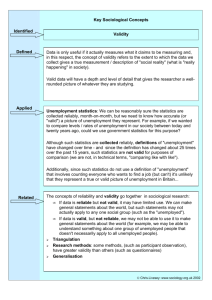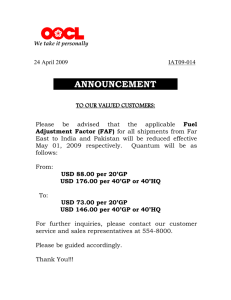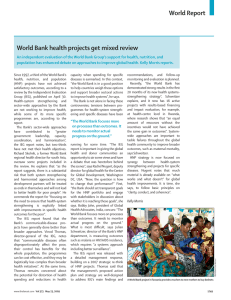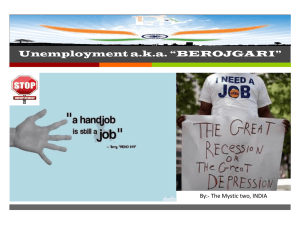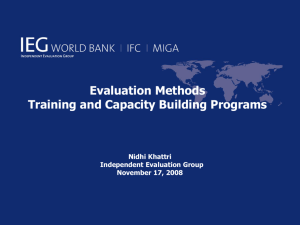Opportunity in crisis? navigating the perfect storm
advertisement
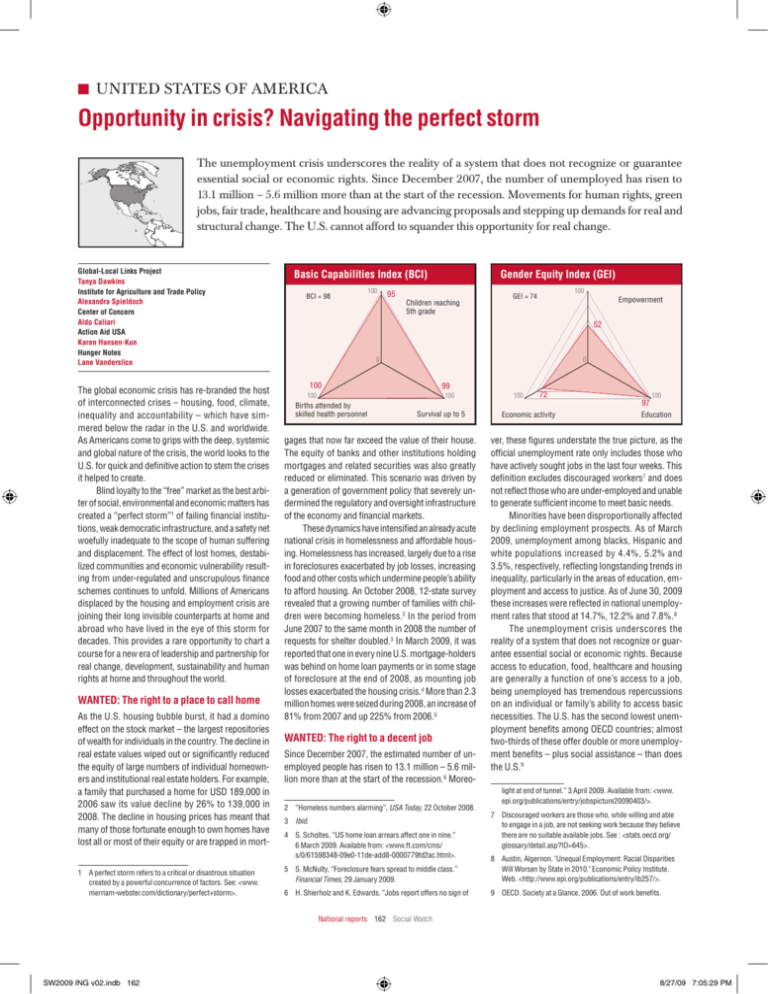
o = 95,2 100 100 united states of america IEG of Moldova = 73,9 99 100 53 Opportunity in crisis? Navigating the perfect storm 45 0 0 99 100 100 69 a = 99,1 87 100 100 100 0 The unemployment crisis underscores the reality 100 of a system that does not recognize or guarantee 100 69of unemployed has risen 100 100 2007, the number 100 100 100 essential social or economic rights. Since December to 96 98 13.1 million – 5.6 million more than at the start of the recession. Movements for human rights, green jobs, fair trade, healthcare andBCI housing are advancing proposals and stepping demands for real and of Portugal = 99,4 IEG of Poland = 70 IEG ofup Portugal = 73,1 structural change. The U.S. cannot afford to squander this opportunity for real change. Global-Local Links Project Tanya Dawkins 100 Policy Institute for Agriculture and Trade Alexandra Spieldoch Center of Concern Aldo Caliari Action Aid USA 37 Karen Hansen-Kun Hunger Notes 0 Lane Vanderslice a = 59,2 = 98,3 BCI of Moldavia = 0 IEG of Mexico = 60,5 The global economic crisis has re-branded the100 host 100 81 83 of interconnected crises – housing, food, climate, inequality and accountability – which have simmered below the radar in the U.S. and worldwide. IEG of Uganda = 67,2 As Americans come to grips with the deep, systemic and global nature of the crisis, the world looks to the U.S. for quick and definitive action to stem the crises it helped to create. Blind loyalty to the “free” market as the best arbiter of social, environmental100 and economic matters has created a “perfect storm”1 of failing financial institutions, weak democratic infrastructure, and a safety net 56 of human suffering woefully inadequate to the scope and displacement. The effect of lost homes, destabilized communities and economic vulnerability result0 ing from under-regulated and unscrupulous finance schemes continues to unfold. Millions of Americans displaced by the housing and employment crisis are 64 100 100 joining their long invisible counterparts at home 96 and abroad who have lived in the eye of this storm for decades. ThisIEG provides a rare=opportunity to chart a de Belgica 72,2 course for a new era of leadership and partnership for real change, development, sustainability and human rights at home and throughout the world. WANTED: The right to a place to call home As the U.S. housing bubble burst, it had a domino effect on the stock market – the largest repositories of wealth for individuals in the country. The decline in real estate values wiped out or significantly reduced the equity of large numbers of individual homeowners and institutional real estate holders. For example, a family that purchased a home for USD 189,000 in 2006 saw its value decline by 26% to 139,000 in 2008. The decline in housing prices has meant that many of those fortunate enough to own homes have lost all or most of their equity or are trapped in mort1 A perfect storm refers to a critical or disastrous situation created by a powerful concurrence of factors. See: <www. merriam-webster.com/dictionary/perfect+storm>. Basic Capabilities Index (BCI) 100 BCI = 98 95 99 100 BCI Gender Equity Index (GEI) Children reaching 5th grade 100 GEI = 74 Empowerment 52 0 0 100 95 99 100 100 Births attended by skilled health personnel Survival up to 5 BCI of Estados gages that now far exceed the value of their house. Unidos de América = 98.1 The equity of banks and other institutions holding mortgages and related securities was also greatly reduced or eliminated. This scenario was driven by a generation of government policy that severely undermined the regulatory100and oversight infrastructure of the economy and financial88markets. These dynamics have intensified an already acute national crisis in homelessness and affordable housing. Homelessness has increased, largely due to a rise in foreclosures exacerbated by job losses, increasing food and other costs which0 undermine people’s ability to afford housing. An October 2008, 12-state survey revealed94 that a growing number of families 99 with chil100 100 dren were becoming homeless.2 In the period from June 2007 to the same month in 2008 the number of 3 requests forICB shelter doubled. In =March de Costa Rica 93,5 2009, it was reported that one in every nine U.S. mortgage-holders was behind on home loan payments or in some stage of foreclosure at the end of 2008, as mounting job losses exacerbated the housing crisis.4 More than 2.3 million homes were seized during 2008, an increase of 81% from 2007 and up 225% from 2006.5 WANTED: The right to a decent job Since December 2007, the estimated number of unemployed people has risen to 13.1 million – 5.6 million more than at the start of the recession.6 Moreo2 “Homeless numbers alarming”, USA Today, 22 October 2008. 3 Ibid. 4 S. Scholtes, “US home loan arrears affect one in nine.” 6 March 2009. Available from: <www.ft.com/cms/ s/0/61598348-09e0-11de-add8-0000779fd2ac.html>. 100 72 Economic activity 97 100 100 Education BCI of V IEG of Usa = 73,8 ver, these figures understate the true picture, as the official unemployment rate only includes those who have actively sought jobs in the last four weeks. This definition excludes discouraged workers7 and does not reflect those who are under-employed and unable to generate sufficient income to meet basic needs. 100 Minorities have been disproportionally affected by declining employment prospects. As of March 2009, unemployment among 48 blacks, Hispanic and white populations increased by 4.4%, 5.2% and 3.5%, respectively, reflecting longstanding trends in 0 inequality, particularly in the areas of education, employment and access to justice. As of June 30, 2009 54 reflected in national unemploythese increases were 100 100 8 ment rates that stood at 14.7%, 12.2% and 98 7.8%. The unemployment crisis underscores the reality ofIEG a system that does recognize or guarde Costa Rica not = 66,8 antee essential social or economic rights. Because access to education, food, healthcare and housing are generally a function of one’s access to a job, being unemployed has tremendous repercussions on an individual or family’s ability to access basic necessities. The U.S. has the second lowest unemployment benefits among OECD countries; almost two-thirds of these offer double or more unemployment benefits – plus social assistance – than does the U.S.9 99 100 light at end of tunnel.” 3 April 2009. Available from: <www. epi.org/publications/entry/jobspicture20090403/>. 7 Discouraged workers are those who, while willing and able to engage in a job, are not seeking work because they believe there are no suitable available jobs. See : <stats.oecd.org/ glossary/detail.asp?ID=645>. 5 S. McNulty, “Foreclosure fears spread to middle class.” Financial Times, 29 January 2009. 8 Austin, Algernon. "Unequal Employment: Racial Disparities Will Worsen by State in 2010." Economic Policy Institute. Web. <http://www.epi.org/publications/entry/ib257/>. 6 H. Shierholz and K. Edwards. “Jobs report offers no sign of 9 OECD. Society at a Glance, 2006. Out of work benefits. National reports 162 Social Watch SW2009 ING v02.indb 162 8/27/09 7:05:29 PM ICB d WANTED: The right to food security Americans have also been hit hard by the food crisis. Food banks, for example, have had great difficulty keeping up with demand as the public is donating less and there are less food stocks available.10 In the Midwest and the South the food crisis has been compounded by flooding and hurricanes, resulting in a decrease in crops to farmers’ markets and local food distribution.11 U.S. Department of Agriculture statistics indicate that at least 36 million people, including more than 4 million children, live in food insecure households.12 Foodlinks America reports that, “more lowincome Americans received food benefits under the Supplemental Nutrition Assistance Program (SNAP) in January 2009 than at any other time in the history of the program. Over 32.2 million people relied on the program that month, erasing the month-old record of 31.8 million. The caseload increase was fueled by the 11 states that had participation increases in excess of 20% between January 2008 and January 2009: Utah, Florida, Nevada, Arizona, Wisconsin, Georgia, Vermont, Maryland, Texas, and Massachusetts.”13 In this food crisis, U.S. agribusinesses have profited from the chokehold that some large corporations have over both production and distribution even as smaller U.S. farmers struggle with rising input costs and lower returns.14 Rejoining the world – details matter Internationally, the Obama Administration has quickly shown leadership since the presidential election. In early April 2009, the State Department announced it would seek a seat on the Human Rights Council, saying that “Human rights are an essential element of American global foreign policy.”15 The Administration also gave Cabinet-level status to the newly appointed US Ambassador to the United Nations. President Obama engaged in the G-20 process, pledging new funds to address the economic downturn. However, the USD 100 billion in new funding for 10 D. Quizon, “Donations down, demand up at food distributors”. The State Press, 16 September 2008. Available from: <www.statepress.com/node/935>. 11 E. Holt Gimenez, “The World Food Crisis: What’s Behind It and What We Can Do About It.” Policy Brief. Food First, 16 October 2008. 12 M. Nord, M. Andrews and S. Carlson, “Household Food Security in the United States, 2007.” Economic Research Report, ERR-66, November 2008. 13 Foodlinks America Newsletter, 10 April 2009. The ‘SNAP’ programme is the renamed U.S. Food Stamps programme that helps low-income families and people buy affordable, healthy food. 14 US Working Group on the Food Crisis. “Backgrounder on the Global Food Crisis”. 2008. 15 US Department of State, “US to Run for Election to the UN Human Rights Council”, press release, 31 March 2009. the IMF has been met with deep scepticism among civil society organizations who question whether the IMF is equipped to implement real economic stimulus packages rather than its traditional and harmful austerity programmes. The Administration pledged to double U.S. assistance for long-term agricultural development assistance to more than USD 1 billion in 2009, and then expanded its offer to amount to USD 3.5 billion of aid for food security over three years. Although this money is much needed, how the money will be spent matters a great deal – and there are great differences of opinion. For example, the Congress and the Administration continue to promote technological solutions, including investments in biotechnology and Genetically Modified Organisms, while U.S. food activists are pushing for approaches that prioritize local food systems and climate friendly agricultural practices. On climate, the Administration has engaged in the process leading up to the December talks for a new global climate treaty, but its positions are unclear. For example, it has yet to ratify the Kyoto Treaty and to define its global commitments to cap emissions at a time when urgent action is needed. Bright spots and steps in the right direction President Barack Obama’s administration has sought to respond to the crisis with additional funding and policy initiatives focused on stabilizing financial markets, domestic job creation (including green jobs), expanded benefits for the recently unemployed and initiatives directed at homeowners who have recently lost or are at risk of losing their homes. Elected officials are under increasing pressure to respond to the public’s growing awareness that markets must also serve broader social, economic and environmental goals. Proposed policy responses such as mandatory interest rate reductions, restructuring the bankruptcy laws, and measures to curb excessive domestic and international financial speculation –among other proposals– are also moving through the legislative process. The Administration has placed new restrictions designed to close the revolving door between business and government that has contributed so heavily to misdirected policies in key sectors such as housing, finance, trade, health and agriculture. It has indicated support for organic production, stronger competition measures to regulate corporate activity and stronger food safety oversight, and also made pledges for increased funding to support renewable energy and clean fuel standards. The 2008 Farm Bill included an additional USD 100 million to support local food systems, increase access to healthy food and support organic, beginning and minority farmers. While insufficient to meet demand, these are important and encouraging steps. Looking ahead Government intervention is a critical element in ensuring economic recovery and a new direction in domestic economic development. Ensuring citizen oversight and accountability remains the missing link. For example, initiatives like <www.recovery. gov> showcase the Administration’s unprecedented and innovative use of technology to keep the public informed. Information, however, is not a substitute for the kind of engagement and accountability which must be at the heart of real change and national recovery. Domestic movements for human rights, green jobs, fair trade, healthcare and housing are advancing innovative proposals and stepping up demands for real and structural change. For example, the movement to hold the US accountable to international human rights standards, through organizing and education on the interconnected nature of civil, political, social, economic and cultural rights is taking root.16 A 2008 World Public Opinion Poll showed that vast majorities of Americans favor most human rights and principles of the Universal Declaration of Human Rights, including equality, women’s rights, racial justice, the rights to food, education and health care and believe strongly that their Government has responsibility to secure them.17 Translating changing attitudes into sustained public will and new policies remains a central challenge. Bold action and solutions are needed. The U.S. cannot afford to squander this opportunity. n 16 Although it is a signatory to the International Convention on Civil and Political Rights (ICCPR) and the International Convention on the Elimination of all forms of Racial Discrimination, the U.S. has not yet ratified the International Convention on Economic, Social and Cultural Rights (ICESCR) and the Convention on the Elimination of All Forms of Discrimination Against Women (CEDAW). 17 “60th Anniversary: New poll shows vast support for Universal Declaration of Human Rights principles.” The Opportunity Agenda. Available from: <opportunityagenda. org/60th_anniversary_poll_day_great_degree_consensus_ among_americans_principles_enunciated_universal_dec>. Social Watch 163 United States of America SW2009 ING v02.indb 163 8/27/09 7:05:30 PM

